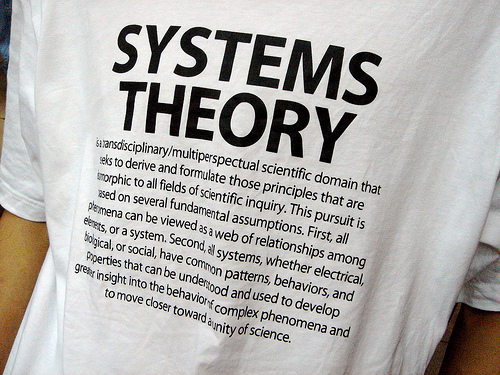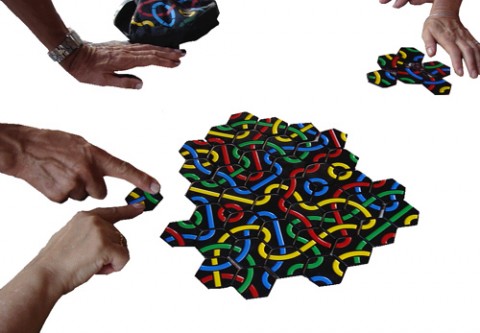Tag Archive: systems
October 14, 2010

|Photo by Aristocrats-hat|http://www.flickr.com/photos/36821100@N04/3896331106|
Peggy Holman is the co-author of a book that I consider to be one of the bibles for my work here at IISC – The Change Handbook. This wonderful resource was also required reading for a graduate course I taught on organizational and community change models at Antioch New England. Building on this essential tome, Peggy has recently authored another book that I look forward to diving into more deeply – Engaging Emergence: Turning Upheaval Into Opportunity. Her exploration of how to engage chaos in social systems and bring about greater coherence is certainly timely and in line with much of the conversation you see on this blog.
In a recent post of her own, Peggy highlights an interesting comment that appeared in a review of her newest work. Read More
June 14, 2010

|theory.isthereason.com|http://theory.isthereason.com/?p=1764|
One of our consultants just wrote the following e-mail to our team here at IISC. I thought it would be a good idea to put the question out to our readers – any thoughts?
Hello Colleagues,
I am wondering if you might have ideas about two things:
1. How to introduce systems thinking to a group – simply…
2. What questions you might ask when trying to identify leverage points in a planning process?
Context: The group has gathered a lot of anecdotal information, the intention is to gather additional information on best practices and research, however, we are not there yet. So how to begin to identify levers when we don’t have the benefit of having all data?
Thanks for any thoughts you might have on this!
June 14, 2010

|theory.isthereason.com|http://theory.isthereason.com/?p=1764|
One of our consultants just wrote the following e-mail to our team here at IISC. I thought it would be a good idea to put the question out to our readers – any thoughts?
Hello Colleagues,
I am wondering if you might have ideas about two things:
1. How to introduce systems thinking to a group – simply…
2. What questions you might ask when trying to identify leverage points in a planning process?
Context: The group has gathered a lot of anecdotal information, the intention is to gather additional information on best practices and research, however, we are not there yet. So how to begin to identify levers when we don’t have the benefit of having all data?
Thanks for any thoughts you might have on this!
May 20, 2010

|Photo by woodleywonderworks|http://www.flickr.com/photos/wwworks/2223340202|
Last Thursday my IA colleagues Ashley Welch and Andy Atkins and I teamed up with David McConville of The Elumenati and Ned Gardiner of NOAA to take a group of cross-sectoral leaders and thinkers on a unique journey. This trip included a visit to the outer edges of our universe, passing through our solar system, galaxy, and neighboring galactic bodies. Then, out of breath, we zoomed back in to take a new look at our planet Earth through the lens and visualized overlay of data about our terrestrial home – warming trends, population density, biodiversity and traffic patterns. Welcome to the GeoDome!
Read More
May 13, 2010

|Photo by Flowery *L*u*z*a*|http://www.flickr.com/photos/luchilu/747345256|
For the past few weeks, in a series of Thursday posts, we’ve addressed what it takes to tap the full potential of collaboration to shift to more environmentally sustainable ways of living and working. We’ve explored the importance of bringing diverse systemic perspectives together and developing shared identities and values as a way of achieving greater ecological intelligence and commitment. And as a friend of mine says, you can bring great groups together with the best of intentions and still end up with nothing or a mess. So what else can we put into place to help ensure we reach the sustainable ends we seek?
Read More
May 6, 2010

|Photo by jordigraells|http://www.flickr.com/photos/jordigraells/2097554407|
“In dealing with complex problems, our ability may be bounded, but our diversity is not. Diversity – be it based on identity, training or vocation — may be our best asset.”
– Scott E. Page
In last Thursday’s post, we talked about the importance of developing a shared identity among stakeholders, and doing this early in a collaborative process, as a way of developing greater commitment to collective interests as well as bolstering the inclination to think about and act in accordance with more long-term risks and benefits. Clearly more needs to be said about the WHO that is engaged in this work and how this aligns with sustainability.
Read More
September 18, 2009
A few months ago, while attending the 95th session of the Hampton University Minister’s Conference, I heard my most favorite preacher of all times, the Rev. Dr. Claudette Copeland use a brilliant illustration that got me thinking about systems thinking, networks and collaboration. I will surely integrate this illustration into my consulting and training practice, and recount it herewith for your enjoyment and cogitation: Read More
July 2, 2009
In her analysis of leverage points to intervene in a system, the late Donella Meadows highlighted mindsets as one of the most fundamental levels on which to focus if one is hoping to make deep and long-lasting change. The case for this is well made in a recent article in Mass Audubon’s Sanctuary Magazine.
Katherine Scott writes in “The Wind in the Wash” about the lost art of the clothesline in America, largely obscured by the now ubiquitous clothes dryer. In this day and age, notes Scott, many children haven’t the remotest idea of what a clothespin is. She is not simply waxing nostalgic, but making an important point about the way we think.
Read More





